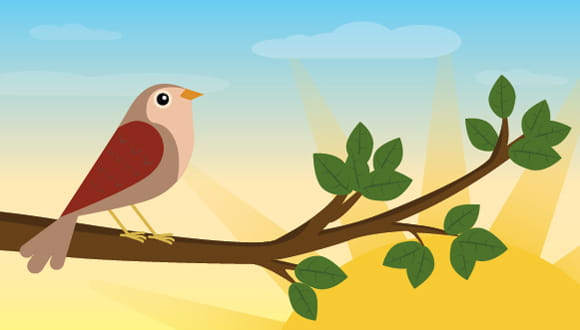So, You're A Morning Person: Is That Good?
Oct. 12, 2020 - Katie McCallumYou naturally wake up early, even if you went to bed late. You draft texts but wait to send them until a more "decent" hour — 7 a.m. is way too early to wake someone up for a cat video, right? You like to get up and get to work, and you also look forward to starting your bedtime routine as soon as the sun starts going down.
You're a morning person — or so you've been called by your friend who hates traveling with you since it means he or she has to wake up before 11 a.m. while on vacation.
Morning person vs. night owl. Is there really a difference? And is being more productive in the early hours of the morning really as advantageous as some people make it out to be?
Whether you're curious about what it means to be a morning person, or just an envious night owl in search of answers, Dr. Doha Ayish, neurologist at Houston Methodist, is here to explain what makes a morning person a morning person, as well as why being a morning person is usually a good thing.
What does being a morning person even mean?
If you're a morning person, chances are you already know you're one. Sure, you're groggy when you wake up in the morning, but you barely need your alarm clock. And it's not too hard for you to get up and get going. In fact, it's your tendency to be up-and-at-em — even if you don't have anything specific to be doing.
"Morning people are those who rise from sleep fairly easily and are most productive and/or active in the mornings," says Dr. Ayish "If you're a morning person, your brain is most alert in the morning, and you're generally very good at harnessing this energy and focus to get tasks, work and chores done."
Because your brain is more alert in the morning, you've probably also noticed that being a morning person means it's harder for you to sleep in, even if you went to bed late or didn't get a good night's rest.
Why are some people morning people and others aren't?
Whether you're a morning person or a night owl, you have an internal clock that runs on a 24-hour cycle and helps control things like your hunger, your brain waves, your mood, and, you guessed it, your sleep/wake cycle. Your internal clock is set, primarily, by light/dark cues from your environment. It's why our natural tendency is to sleep at night and be awake during the day.
A morning person is someone whose own particular sleep/wake tendency follows this natural cycle.
So, why then are some people more alert in the morning while others just aren't?
"Everyone's internal clock runs at a slightly different pace. While light/dark cues are the primary input for a person's internal clock, there are other inputs," explains Dr. Ayish. "For instance, your internal clock is also influenced by your age, gender and even your genes."
In fact, your internal clock can also be influenced by non-ambient light (bright lights around your home or work), as well as when you're able to make time for a meal.
What are the benefits of being a morning person?
According to Dr. Ayish, being a morning person has many benefits, primarily because it's the natural tendency of the human brain.
"Our brains are hardwired to be more alert in the morning, providing a mental boost to help you focus and concentrate and giving you the energy you need to get through the day," says Dr. Ayish. "In fact, a study on high school students revealed that being a morning person is more favorable than being a night owl when academic achievements are considered, with night owls being more likely to have a lower overall GPA, math-science GPA and language GPA."
There can be a downside to being a morning person, however, if you're not being careful about your sleep schedule.
"Since your brain is trained to rise early every day, being a morning person can be problematic if you go to bed late or don't get enough quality sleep," warns Dr. Ayish. "This is why it's important to keep a consistent sleep schedule."
If you're a morning person, you're probably glad to hear it's a good thing. But sometimes — like those lazy weekend mornings — being a morning person can still feel like a burden. You may even wish you were a night owl instead.
Can a morning person become a night owl?
Some days, you just want to sleep in. Yet here you are, awake at the crack of dawn while everyone else in your house is sound asleep — a perfect time to wonder about what it would take to become a night owl.
"People who have to transition from a day shift to a night shift can tell you just how hard it is to adjust your sleep/wake cycle, even by just a few hours," says Dr. Ayish. "It's challenging because it requires adjusting your internal clock, which can take time and require some environment modifications. For instance, you can encourage the shift by decreasing your exposure to ambient light during the daytime and increasing your exposure to bright lights at nighttime. It really is a whole lifestyle change, though."
Plus, while it's frustrating that your body won't let you sleep in (especially if you got to bed late the night before and know you need more sleep), we now know that being a morning person comes with a lot of benefits. So, is the switch really worth it?
"If you ask me, the pros of being a morning person outweigh those of being a night owl, so I say keep doing what you're doing," adds Dr. Ayish.


